By Rich Heidorn Jr.
The Federal Energy Regulatory Commission last week denied rehearing in a challenge to PJM’s method of funding Financial Transmission Rights, closing a docket that had been in limbo for almost two years — and potentially clearing the decks for a unilateral rule change proposal by the RTO.

“We continue to find that allocation of real-time balancing congestion to current FTRs has a reasonable basis, because FTR holders are in the best position to reflect the associated underfunding in the value of FTRs,” the commission wrote. “Allocation to other parties would not create any incentive to reduce real-time balancing congestion and would provide even less of an ability to provide any reflection of the value of the underfunding in any instrument.”
The commission gave no reason for the timing of its ruling (EL13-47-001) on the rehearing request, which was filed by FirstEnergy, J. Aron & Co., DC Energy, Vitol and Public Service Electric and Gas and its affiliates after the commission denied a complaint by FirstEnergy in June 2013.
But it came after just days after PJM suggested it may make a unilateral section 206 filing to break a deadlock among stakeholders over potential rule changes.
PJM’s June 2 filing with the commission noted that the FTR funding shortfall the companies had complained of had been resolved — at least for now, with FTRs fully funded since the current planning year began in June 2014.
PJM said it had addressed underfunding by being more conservative in its annual modelling of Auction Revenue Rights and FTRs, particularly the impact of transmission outages, market-to-market flowgates and loop flow.
“Thus, while FTR underfunding has been resolved for now, the consequence is that customers have experienced reduced ARR allocations,” PJM said. “PJM’s solution has therefore shifted revenues from ARR holders, through a reduction of the quantity of ARRs, to FTR holders, in the form of increased FTR funding … PJM believes that the resulting status quo is less equitable and desirable than it would prefer.”
A PJM task force formed last spring to address the issue deadlocked over potential solutions. (See Move to Disband FTR Task Force Splits PJM Members.)
“Redesigning the funding and allocation processes for FTRs and ARRs is fundamentally an issue of cost allocation among different classes of members. Therefore, it is unlikely that stakeholders will be able to come to consensus on a long-term solution to address PJM’s FTR design,” PJM said. “Indeed, PJM expects that in the future any significantly proposed market rule changes aimed for an improved, more efficient and equitable ARR and FTR design may have to be prompted by a filing made by PJM under section 206 of the Federal Power Act.”



